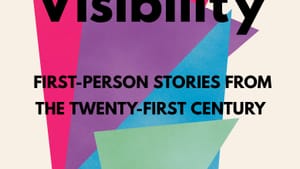Stay in the Loop
BSR publishes on a weekly schedule, with an email newsletter every Wednesday and Thursday morning. There’s no paywall, and subscribing is always free.
Being in our own words
‘Disability Visibility,’ edited by Alice Wong

Disability Visibility: First-Person Stories from the Twenty-First Century, a new collection from editor Alice Wong (founding director of the Disability Visibility Project), marks the 30th anniversary of the Americans with Disabilities Act (ADA). Usually, when you finish reading a book, you can think of a few people you’ll recommend it to. In this case, I will not recommend it to a few folks. I recommend Disability Visibility to everyone.
By our own accounts
Whether or not you (like me) have a disability reflected in these pages, these perspectives will shake not only the way you perceive disability but how you perceive the fabric of a society we all live in. From a blind astronomer who converts data into sound, to a narrative of deafness in prison, to commuting with cerebral palsy, these stories will grab you from the first page.
But they’re not about finding inspiration in disabled bodies and minds, or “overcoming” disability. “These stories do not seek to explain the meaning of disability or elicit empathy,” Wong writes in her introduction. “Rather they show disabled people simply being in our own words, by our own accounts.”
One of Wong’s goals is to increase diverse representations of disabled people—representations often confined to white men in mass media (think Daniel Day-Lewis in My Left Foot or Bryan Cranston in The Upside, she says). And with a bold eye for sources as wide ranging as essays, congressional testimony, a eulogy, and podcast and TED talk transcriptions, she delivers an unparalleled intersectional view, often highlighting underrepresented disabled BIPOC and LGBTQ+ voices.
Thriving with disability
The collection opens with a reprint of Harriet McBryde Johnson’s 2003 New York Times Magazine piece, Unspeakable Conversations. Her essay, detailing encounters with world-renowned bioethics professor Peter Singer, author of Animal Liberation, begins like this:
He insists he doesn't want to kill me. He simply thinks it would have been better, all things considered, to have given my parents the option of killing the baby I once was, and to let other parents kill similar babies as they come along and thereby avoid the suffering that comes with lives like mine and satisfy the reasonable preferences of parents for a different kind of child. It has nothing to do with me. I should not feel threatened.
Life for wheelchair users makes up some of Disability Visibility, but true to Wong’s philosophy that “disability is not a monolith, nor is it a clear-cut binary of disabled and nondisabled,” there are a range of other perspectives, including writers and speakers with mood disorders, intellectual disabilities, chronic illness, incontinence, and facial disfigurement.

And their stories transform disability from an individual’s problem to a problem of systemic barriers that we could all help dismantle. Recoiling at thoughts of disability (as in a recent disgraceful TikTok “challenge” in which parents film their kids’ frightened responses to pictures of disabled people) becomes a self-fulfilling prophecy, when the reality is that from theaters to transit to school, from the lab to the podium to the bedroom, many disabled people thrive with simple accommodations. Why revile disability when we instead could remove the very barriers that make people dread it?
A true story
I was particularly struck by A.H. Reaume’s contribution, Why My Novel Is Dedicated to My Disabled Friend Maddy. She writes about the “fierce and patient and tender and rare” partnership with another disabled woman that allowed her to finish her novel after a brain injury rendered the traditionally solo version of writing work impossible for her.
“Independence is a fairy tale that late capitalism tells in order to shift the responsibility for care and support from community and state to individuals and families,” Reaume writes. Disabled or not, what becomes possible when we open ourselves up to new networks of mutual reliance?
“I am refusing to tell a story of single-handed success in which I valiantly overcame my disability,” she insists. “I want to tell a story that is more complex and true.”
Reading next
Be prepared to finish Disability Visibility with a list of books you’re burning to add to your library. Just for a start, I’ll be getting Haben Girma’s Haben: The Deafblind Woman Who Conquered Harvard Law, Marcus Rediker’s The Fearless Benjamin Lay: The Quaker Dwarf Who Became the First Revolutionary Abolitionist, Harriet McBryde Johnson’s 2006 memoir Too Late To Die Young: Nearly True Tales from a Life, Keah Brown’s The Pretty One: On Life, Pop Culture, Disability, and Other Reasons to Fall in Love with Me, and Ariel Henley’s upcoming memoir, A Face for Picasso: Coming of Age with Crouzon Syndrome.
Image Descriptions:
The cover of the book Disability Visibility: First-Person Stories from the 21st Century. The cover design has overlapping triangles in bright colors under the title text. Image courtesy of Vintage Books.
Photo of Alice Wong, an Asian American woman in a power chair. She is wearing a blue shirt with a geometric pattern with orange, black, white, and yellow lines and cubes. She is wearing a mask over her nose attached to a gray tube and bright red lip color. She is smiling at the camera. Image and description courtesy of the Disability Visibility Project.
What, When, Where
Disability Visibility: First-Person Stories from the Twenty-First Century. New York: Vintage Books, June 30, 2020. 309 pages, paperback; $16.95. Visit Bookshop.org for more info and to purchase.
Disability Visibility features content notes for sensitive topics before each piece. It’s available as an audiobook, and it’s also the first adult work of nonfiction to have a full plain language translation.
Sign up for our newsletter
All of the week's new articles, all in one place. Sign up for the free weekly BSR newsletters, and don't miss a conversation.

 Alaina Johns
Alaina Johns